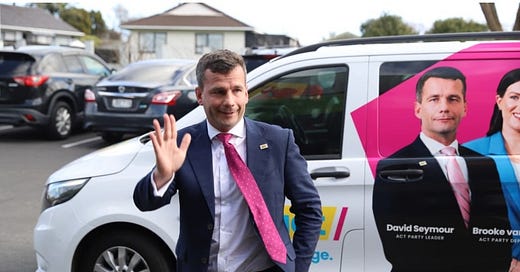Cutting benefits won't heal addiction / A.J. Hendry
Act have proposed to cut benefits if people suffering addiction don't engage in recovery. And yet, fear never heals, only love does that...
Recently, the Act Party released a new policy - as part of their welfare package - that would require people suffering from addiction to engage in a recovery program or risk losing their benefit.
Their stated goal is to provide "hope and opportunity" to people suffering from addiction, utilizing sanctions to "motivate" people to get back into work.
The logic seems to be, that people who are on the benefit, and who also have an addiction, are only in that situation because they have been allowed to live too comfortably. If we believe in these people, than we must give them tough love, demand they heal from their addiction and punish them if they don't.
The problem with this logic - and the policy - is the manner in which it displays a clear lack of understanding regarding mental health and addiction.
First, anyone who believes that surviving on the benefit is a comfortable and convenient way to live, has been misinformed. A single adult on the Job Seeker gets about $337.74 a week (after tax). Which is roughly $17.5k per annum.
If you're a young person it's even less. For example, if you're between 16-24yrs old (either on the youth payment or job seeker) you'll get $294.18 per week (roughly 15k per annum after tax), regardless of the fact that the cost of surviving for an independent young person is the same as that of an adult.
I want to encourage you for a moment to step back and ask yourself, would you be comfortable living on 15-17k a year?
Now, think about the shame that many people who have to access the benefit to survive are made to feel. Think about the pressure that is on them to just get by every day. About how stressful and dehumanizing it can be to go back to winz and ask for help with rent, for food, to be made to prove that normal things you and I take for granted, are essential to their daily lives.
And now imagine you're also suffering from a mental illness. That you struggle with depression, anxiety, or some other mental illness (diagnosed or not). Perhaps you've experienced some past truama. Perhaps you're still living it. Perhaps whatever is going on feels overwhelming and outside your control. Imagine that you haven't the support or resources around you to heal and recover, and so you've found another way to survive.
You see, addiction is never the problem. It's a solution.
People who use substances to cope with their reality are often doing so to fill some form of unmet need. To manage their mental health, to drown out the past, to cope with the present, to survive in a world that is trying to make it so they don't.
This is not an easy life.
And those of our whānau who are mentally unwell and using substances to survive, will not be served by threats to cut off their source of income. This will not bring healing for people, nor will it support some of our most structurally marginalized whānau into recovery.
In fact, it's more likely to make matters worse.
As I read this policy, my concern turned specifically to those of our young people who are experiencing homelessness. It is well understood that our mental health and addiction services are not adequately equipped to support young people on the far margins of our society.
Rangatahi that experience homelessness often are unable to access services due to the simple fact that they are not equipped, designed or resourced to meet their needs.
This approach would risk further marginalizing our young people, placing them at greater risk, increasing their risk of suicide, of becoming involved in the justice system, of needing to access state funded services and support.
If you want to support peoples mental health, you provide them with the support they need. You ensure they have their basic needs met, that they have access to kai, to safe and stable housing, you provide them with access to mental health care that meets their needs.
You don't threaten to take away their access to the very basics every human being needs to survive.
The opposite of addiction is not fear, but connection. People heal when they feel safe, loved, cared for, and have their basic human needs met.
This policy provides us, as New Zealanders, with an opportunity to reflect on what sort of welfare system we want in this country. And perhaps more importantly, who we want to be as a people, as a nation?
Do we want to be the sort of people that save a few bucks in the welfare system by punching down on poor and vulnerable people?
Or are we the sort of people that look after each other? That acknowledge when people are hurting, that provide those who are struggling with manaaki, with care, with love, with support?
These systems we build are really just vehicles for our own collective values.
The question we have to ask ourselves is what does our current system say about who we are?
And as we look to change it, what could it say about who want to be?
#LoveIsTheWay
A.J. Hendry is a Laidlaw College graduate, and a Youth Development Worker and rangatahi advocate, working in the Youth Housing and Homelessness space. He leads Kick Back, a service supporting rangatahi experiencing homelessness and is also an advocate working collectively to end youth homelessness in Aotearoa. He is also the curator and creator of When Lambs Are Silent.





